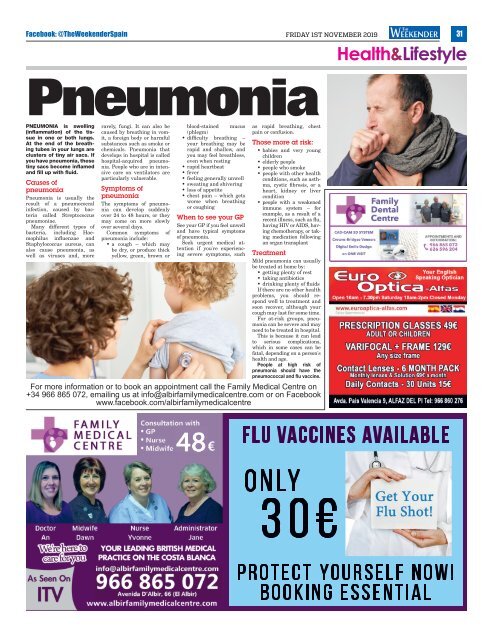You also want an ePaper? Increase the reach of your titles
YUMPU automatically turns print PDFs into web optimized ePapers that Google loves.
Facebook: @The<strong>Weekender</strong>Spain<br />
FRIDAY 1ST NOVEMBER 2019 31<br />
Health&Lifestyle<br />
Pneumonia<br />
PNEUMONIA is swelling<br />
blood-stained mucus as rapid breathing, chest<br />
pain or confusion.<br />
(inflammation) of the tissue<br />
in one or both lungs.<br />
At the end of the breathing<br />
tubes in your lungs are<br />
clusters of tiny air sacs. If<br />
you have pneumonia, these<br />
tiny sacs become inflamed<br />
and fill up with fluid.<br />
Causes of<br />
pneumonia<br />
Pneumonia is usually the<br />
result of a pneumococcal<br />
infection, caused by bacteria<br />
called Streptococcus<br />
pneumoniae.<br />
Many different types of<br />
bacteria, including Haemophilus<br />
influenzae and<br />
Staphylococcus aureus, can<br />
also cause pneumonia, as<br />
well as viruses and, more<br />
rarely, fungi. It can also be<br />
caused by breathing in vomit,<br />
a foreign body or harmful<br />
substances such as smoke or<br />
chemicals. Pneumonia that<br />
develops in hospital is called<br />
hospital-acquired pneumonia.<br />
People who are in intensive<br />
care on ventilators are<br />
particularly vulnerable.<br />
Symptoms of<br />
pneumonia<br />
The symptoms of pneumonia<br />
can develop suddenly<br />
over 24 to 48 hours, or they<br />
may come on more slowly<br />
over several days.<br />
Common symptoms of<br />
pneumonia include:<br />
• a cough – which may<br />
be dry, or produce thick<br />
yellow, green, brown or<br />
(phlegm)<br />
• difficulty breathing –<br />
your breathing may be<br />
rapid and shallow, and<br />
you may feel breathless,<br />
even when resting<br />
• rapid heartbeat<br />
• fever<br />
• feeling generally unwell<br />
• sweating and shivering<br />
• loss of appetite<br />
• chest pain – which gets<br />
worse when breathing<br />
or coughing<br />
When to see your GP<br />
See your GP if you feel unwell<br />
and have typical symptoms<br />
of pneumonia.<br />
Seek urgent medical attention<br />
if you're experiencing<br />
severe symptoms, such<br />
Those more at risk:<br />
• babies and very young<br />
children<br />
• elderly people<br />
• people who smoke<br />
• people with other health<br />
conditions, such as asthma,<br />
cystic fibrosis, or a<br />
heart, kidney or liver<br />
condition<br />
• people with a weakened<br />
immune system – for<br />
example, as a result of a<br />
recent illness, such as flu,<br />
having HIV or AIDS, having<br />
chemotherapy, or taking<br />
medication following<br />
an organ transplant<br />
Treatment<br />
Mild pneumonia can usually<br />
be treated at home by:<br />
• getting plenty of rest<br />
• taking antibiotics<br />
• drinking plenty of fluids<br />
If there are no other health<br />
problems, you should respond<br />
well to treatment and<br />
soon recover, although your<br />
cough may last for some time.<br />
For at-risk groups, pneumonia<br />
can be severe and may<br />
need to be treated in hospital.<br />
This is because it can lead<br />
to serious complications,<br />
which in some cases can be<br />
fatal, depending on a person's<br />
health and age.<br />
People at high risk of<br />
pneumonia should have the<br />
pneumococcal and flu vaccine.<br />
For more information or to book an appointment call the Family Medical Centre on<br />
+34 966 865 072, emailing us at info@albirfamilymedicalcentre.com or on Facebook<br />
www.facebook.com/albirfamilymedicalcentre<br />
FLU VACCINES AVAILABLE<br />
O n ly<br />
3 0 €<br />
P R O T E C T Y O U R S E L F N O W !<br />
B O O K I N G E S S E N T I A L

















